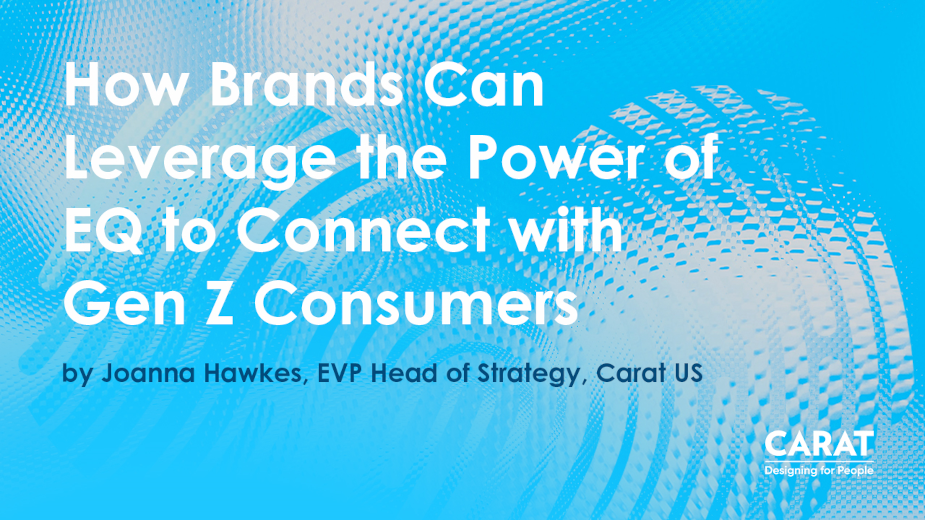
How Brands Can Leverage the Power of EQ to Connect with Gen Z Consumers

Building brand Emotional Intelligence (EQ) isn’t just good for business, it’s also good for consumers. By understanding the factors that contribute to higher EQ, brands can build experiences that better meet consumer needs, meaningfully connect to their values, and drive a deeper relationship, especially when it comes to reaching gen z audiences who crave connection.
Carat’s Brand EQ study explores how brands deliver on emotional intelligence and whether ‘more human’ brands are more successful. The latest study findings, released in June 2022, show that most emotionally intelligent brands grow faster and outperform their peers.
It is no surprise that the newest generation of consumers have different expectations for brands. Gen Z is more value conscious, more experience driven, and more likely to call out brands who lack authenticity. As such, they have very different perceptions of how brands perform on the EQ scale.
Two thirds of the brands measured in the latest study rank lower in EQ against gen z audiences than they do against other generations. So, what is gen z looking for? Before we get into some key findings, let’s look at how Brand EQ is defined.
Brand EQ is defined as performing strongly in the following five areas:
- Self-Awareness (confidence, recognition of feelings) - “This brand seems to know what it stands for.”
- Self-Regulation (self-control, trustworthiness, adaptability) - “This brand behaves with honesty and integrity.”
- Motivation (drive, commitment, initiative, optimism) - “This brand tries hard to deliver a good experience.”
- Empathy (understanding others, feelings, diversity, political awareness) - “This brand understands people like me and what we need.”
- Social Skills (leadership, conflict management, communication skills) - “This brand always communicates in a clear and meaningful way.”
Brands who are under-performing in EQ with gen z
Two brands that came back with a large delta between gen z (attributing lower EQ to them) vs. non-gen z (attributing higher EQ to them) are Amazon and Pepsi.
Amazon
Amazon falls in ranking from #5 overall on the Brand EQ scale to #15 among gen z. Where are these losses coming from? Empathy (i67) and Motivation (i70). For older generations who love the convenience and ease that Amazon services bring to their life, Amazon performs incredibly strong in these areas (76% of non-gen z’ers believe that Amazon understands them & their needs, while 81% agree they deliver a good experience). But convenience and ease appear to be lower priorities for gen z, who find Amazon lacking when it comes to understanding them and delivering against their needs.
Pepsi
Pepsi drops 13 percentage points in Brand EQ among gen z consumers. While under-performance is seen across all key metrics, the largest delta is within Self-Awareness (i74). While 76% of non-gen z’ers believe that Pepsi “seems to know what it stands for,” only 57% of gen z agree. The Kendall Jenner BLM ad certainly didn’t help with perception among a generation who craves authenticity and expects brands to back their values with action, not lip service.
Brands who are over-performing in EQ with Gen Z
Starbucks
While Starbucks ranks #17 overall on the Brand EQ scale, it rises to #1 among gen z, performing strongly against every single EQ metric. The metrics that see the biggest gains among gen z are Empathy (i128), Social Skills (i123), and Motivation (i115). In addition to providing a convenient and affordable shared space where they can hang out with their friends, gen z has fallen in love with Starbucks’ social-media-worthy & customisable beverages. TikTok stars are even creating their own concoctions, adding to the hype. With a gen z movement afoot to unionise Starbucks, it’ll be interesting to see if they can hold their ground.
What learnings can we apply to build greater Brand EQ among gen z?
Match Social Skills with Empathy: Resonating with gen z not only requires demonstrating an understanding of their needs and wants (empathy), it requires communicating with clarity & meaning (social skills). This means meeting them where they are, through formats that resonate. With attention low for traditional ad formats, brands like Starbucks see a lot of success reaching gen z through short-form content on TikTok.
Rethink Customer Experience: As we learned from Amazon and Starbucks, customer experience is not limited to functional benefits like ease and convenience. Gen Z wants to participate with brands. That’s why a brand like Amazon - whose customer experience feels functional, not emotional - under-performs in EQ, while Starbucks – who enables customised creativity – over-performs.
Activate with Authenticity: To resonate with gen z, it’s critical that brands know what they are….and what they are not. In Pepsi’s case, an inauthentic marketing campaign stunted their emotional intelligence in the eyes of gen z. Brands who back their values with meaningful actions demonstrate higher scores in Self Awareness.
In today’s fast-paced media and marketing environment, building emotional intelligence requires taking a step back to listen, respond and adapt to consumer needs.













